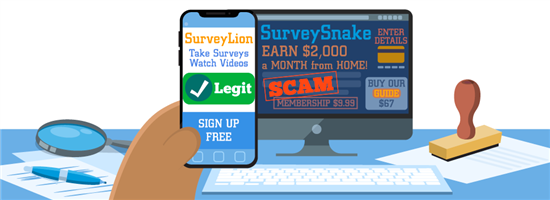Is Survey or Promotions a Legit Way to Make Money?
Scams can look like legit online survey companies. Find out how to tell a real opportunity to make money from an impersonator.
 |
| © CreditDonkey |
Most of us get dozens of survey-for-cash offers in our inboxes. Some online surveys are a legit way to earn a little extra cash on the side. Companies need to run market research on products online, and our responses matter.
The problem is, there are copycat scammers that impersonate actual survey companies. And it's getting harder and harder to tell which websites are for real.
Keep reading to learn how to identify fraudsters and how to safely take online surveys. Plus, take a look at which online survey companies pay the most.
- What Are Scam Surveys?
- 7 Ways to Spot a Survey Scam
- Legit and Real Online Surveys
- 5 Quick Tips for Taking Surveys
What Are Scam Surveys?
Scammers promise you'll make large amounts of money from home. Authentic online survey companies do not actually offer a lot of money. Real survey sites usually offer points, gift cards, coupon discounts, and other token rewards.
And they'll never suggest that someone could make a living by filling out online surveys. Online surveys are a side hustle. You can't quit your day job, but you can get some extra spending money.
Here's a rough breakdown of what you can expect to make on popular survey websites.
- InboxDollars: $0.50 per hour
- Swagbucks: $0.90 per hour
- Survey Junkie: $1.50 per hour
- MyPoints: $1.00 per hour
- Opinion Outpost: $1.50 per hour
Real survey sites partner with companies and make money by having you respond to surveys. Basically, you take a cut of their commission. You usually have to qualify for surveys, which isn't always easy (more on that below). However, fraudsters promise to send you a ton of survey opportunities. Then they try to profit off of you directly instead of the market research company.
They'll flood you with offers for huge sweepstakes (like a $1,000 Walmart gift card) or free samples. It's all a ploy to get your email address and other juicy personal information. Some scam sites could even install malware onto your computer if you click or download a suspicious link.
Now, let's take a deeper dive into the tell-tale signs of a scam survey. These are red flags you absolutely must avoid.
7 Ways to Spot a Survey Scam
Survey scams claim participants can "Earn $2,000 a month!" while "Working from home!" These internet con artists change their names all the time, and some even name themselves similar to legit organizations.
Be safe. Do not participate in any "surveys" that include the following:
- Upfront payment to start: Legit organizations should NEVER ask you for money. This includes membership fees "in exchange" for survey opportunities.
- Sign-ups for other services or products: Legit organizations will never make you wade through offers to get to surveys. And you certainly shouldn't need to buy anything off of a survey site.
- Social Security number, credit card information, or full address: The most any survey should ask for is general demographic information like age, sex, income, ZIP code, etc.
- Big payments that require paying some of it back: This is known as an advance fee fraud. Sometimes scammers will send you a big check and make you return a portion of it or an expensive product. The check will appear successfully cashed for a few days before bouncing.
- Unrealistically large pay amounts: If it's too good to be true, it is. You'll likely only make a couple bucks an hour at a real survey site.
- Email correspondences from an anonymous account: If you get an email from a @gmail or @yahoo account (or another free service), mark it as spam and delete it. Real companies would have their own business email domain.
- Missing a privacy policy: Real sites always have a privacy policy. You can usually find it in the footer.
- FREE: Free items do exist, but usually only for new or small products. And even those are rare.
- Expiration date: If a coupon does not have an expiration date, that's a red flag.
- Source: Always research the source on the Better Business Bureau and look for reviews online.
- CIC: The Coupon Information Center has a blacklist of counterfeit coupons.
Yes, scams exist. But there are also a lot of paying market research companies looking online to expand their survey pools. Next, find out how those legitimate businesses actually work.
Legit and Real Online Surveys
You get paid to take surveys because businesses want to know what you like and attract potential customers like you.
In the past, big brands would run focus groups for market research. But this process was very costly. Most focus groups paid anywhere from $50 to $200 per session (~2 hours).
Nowadays, those big companies hire a market research company to send out online surveys to the people in the right demographic, such as:
- Age
- Income
- Marital status
- Geographic region
Trustworthy survey sites have a finite number of survey opportunities. So they supplement with other paid tasks like watching movies, playing games, reading emails, scanning shopping receipts, etc.
- InboxDollars
- Swagbucks
- Survey Junkie
- Prize Rebel
- MyPoints
5 Tips for Taking Surveys
You're almost ready to safely earn cash for filling out surveys. But there are still a few best practices to help you avoid questionable sites.
- Do not use your primary email address to sign up: Use a separate email address just for surveys. Even with legit survey sites, you'll get a lot of ads, so it's better to play it safe.
- Research a site's BBB rating: Be wary of sites that aren't accredited or don't have a positive track record with the BBB.
- Triple-check the site's URL for spelling: Some fraudsters will rip off a legit site's brand name and subtly change the spelling.
- Find out when points expire: Some sites expire after 1 year.
- Favor sites that are part of a credible marketing association: Such as the Association for Consumer Research.
Bottom Line
You can really make money by filling out online surveys (if you're careful). Always be sure to avoid sketchy third-party sites. Look for real paid surveys online that don't require upfront investments of money. Reputable options include sites like Swagbucks, Survey Junkie, and InboxDollars.
Amber Kong is a content specialist at CreditDonkey, a personal finance comparison and reviews website. Write to Amber Kong at amber.kong@creditdonkey.com. Follow us on Twitter and Facebook for our latest posts.
Note: This website is made possible through financial relationships with some of the products and services mentioned on this site. We may receive compensation if you shop through links in our content. You do not have to use our links, but you help support CreditDonkey if you do.
|
|
| ||||||
|
|
|







